Societal Human Values Series #3
Tibetan Emperor Songtsen Gampo, (Srong-brtsan-sgam-po) reigned from 629-650 CE. Among his many achievements, he disseminated a moral code, known as the Sixteen Principles of Societal Human Values (michö tsangma chudruk). As the Dalai Lama’s translator, Thupten Jinpa writes, “Most of these sixteen values have to do with promoting greater societal well-being and living one’s life with dignity, honesty and respect for others.”
Phakchok Rinpoche frequently emphasizes the importance of living respectfully in society. He encourages students to memorize and to internalize these points of conduct as a core foundation for our practice of the Dharma. If we don’t skillfully maintain this moral code, then whatever higher practices we engage in are unlikely to bear much fruit.
The following topic is the third in a series of explanations of The Sixteen Principles of Societal Human Values.
Principle #3: Repaying the Kindness of One’s Parents (pa ma la drin len jelwa)
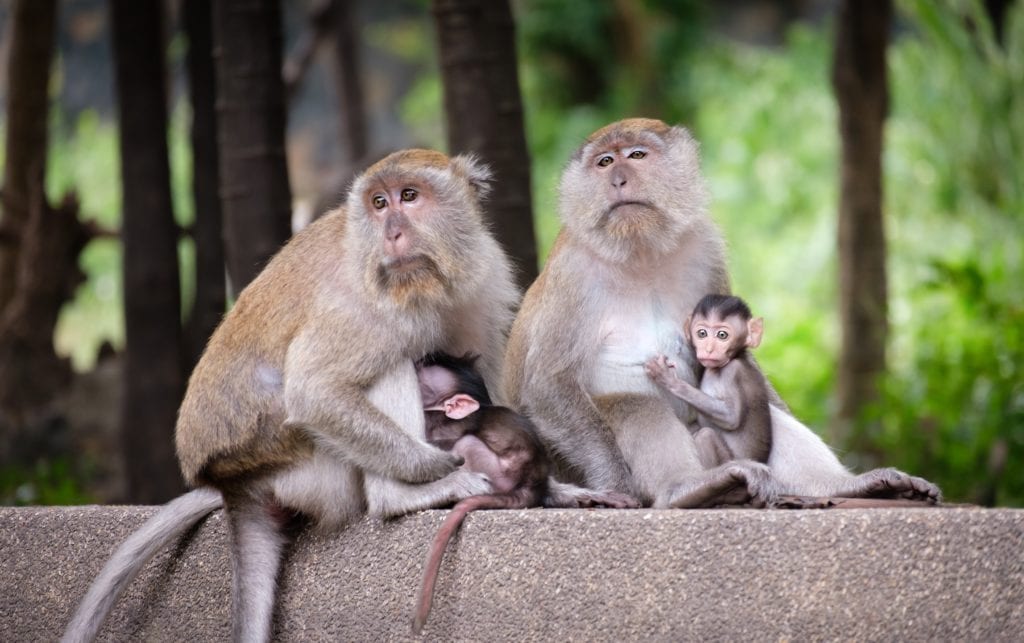
Classic Buddhist texts bring attention to the kindness of one’s parents, often identifying the mother as the epitome of self-sacrifice. Both human and animal mothers express selfless love by tending to their young and protecting them from danger. We can observe this in nature, or even when we watch programs pertaining to the natural world on TV or the internet. Everywhere we look, we see clear examples of animals caring for their young—from the fiercest predators to the smallest and most vulnerable creatures. Even mother lions and tigers will lovingly undergo great hardship in their attempts to feed and protect their cubs. In modern times, we often overlook the reality of our human frailty. As our teachers remind us, human infants are particularly dependent. We could not survive for more than a few hours without care.
Reflecting on the kindness of one’s parents

We should take some time to reflect on this in detail. Without the care and love of our parents, how would we have fed ourselves when we were young? Who cared for us when we were sick and who changed our diapers when we were crying? As we grew from newborns into toddlers, who taught us to talk and to walk, and later to read? How much time and effort did our parents devote to keeping us warm, fed, and safe? Even as they did all these things, they also worked very hard and had other responsibilities.

Parents, and particularly mothers, therefore, serve as the best examples in our practice of loving-kindness and compassion. Even if we have had difficult relationships with less than ideal parents, we can acknowledge that we would not be alive without their care. Buddhist teachers express the difficulties of carrying a fetus for months, and for tending to a helpless baby and infant for years. When we consider these realities, we can understand that we owe our very existence to our parents.
The Example of the Buddha: Family Responsibility
Although the Buddha renounced his princely life and sought wisdom through renunciation, he did not forget his parents. Numerous sources describe the Buddha’s visit to the Trāyastriṃśa heaven to teach the Dharma to his mother who had died shortly after his birth. The Buddha also returned to his home country to instruct his father, Śuddhodana. Many of his Śākya relatives entered the monastic life and eventually achieved liberation as arhats.
The Buddha also instructed his stepmother and maternal aunt, the woman who raised him after his mother’s death. Mahāpajāpatī Gotami eventually obtained permission to take ordination, became a teacher, and subsequently established the order of nuns. Her life story describes her path to arhatship. In the 7th century CE during his stay at Vaiśālī, the Chinese pilgrim monk, Xuanzang, described a stupa located at the site where Mahāprajāpatī Gotamī attained nirvāṇa.
Great Gratitude: Introducing the Dharma to Parents
There is a strong scriptural basis for emphasizing the importance of gratitude toward one’s parents. In the oft-quoted Pali Kataññu Sutta, the Buddha teaches the following:
I tell you, monks, there are two people who are not easy to repay. Which two? Your mother and father. Even if you were to carry your mother on one shoulder and your father on the other shoulder for 100 years, and were to look after them by anointing, massaging, bathing, and rubbing their limbs, and they were to defecate and urinate right there [on your shoulders], you would not in that way pay or repay your parents. If you were to establish your mother and father in absolute sovereignty over this great earth, abounding in the seven treasures, you would not in that way pay or repay your parents.
Why is that? Mother and father do much for their children. They care for them, they nourish them, they introduce them to this world. But anyone who rouses his unbelieving mother and father, settles and establishes them in conviction; rouses his unvirtuous mother and father, settles and establishes them in virtue; rouses his stingy mother and father, settles and establishes them in generosity; rouses his foolish mother and father, settles and establishes them in discernment: To this extent one pays and repays one’s mother and father.

This teaching explains why we owe gratitude to our parents and why we should understand the depth of our debt. It spurs us to remember that the greatest gift we can give to our parents is to patiently introduce them to the Dharma, just as the Buddha did for his own mother and father.
Other stories also emphasize the importance of giving one’s parents the supreme gift of the Dharma. In the popular Pūrnāvadāna text, we read the story of the elder Maudgalyāyana, whose mother had died and was reborn in the Marīcika world system. The elder felt remorse that he had never repaid the kindness of his mother. So, having discerned through his siddhis her location and the way to benefit her, he approached the Buddha and asked him to travel to that world out of compassion to teach the Dharma. Because Maudgalyāyana had achieved the siddhis of magical travel, he and the Buddha were able to visit his reborn mother, and the Buddha instructed her on the Four Truths of the Noble Ones. She thereby obtained stream-entry, the first of the four levels of noble beings.
Although we may not have developed such magical powers, we can offer our parents and others who cared for us the gift of Dharma. Phakchok Rinpoche often suggests that we begin very simply with gentle advice on ways to calm the mind and gladden the heart. We can also teach the Dharma through our own conduct—this is often the best way to make an impact. If the Dharma causes us to be kinder, and more open; and generous with our time, our smiles, and our care, those close to us will notice. Then they may be more open to learning about the Dharma.
Respect for Parents as Accumulation of Merit
In the Buddha’s life-story, the Lalitavistara, we find reminders that the Buddha always respected his parents and other beings. In Chapter 26, we learn that countless lifetimes of such behavior allowed the Buddha to traverse the Buddhist path successfully. In these texts, we learn that the Buddha’s acts of kindness and consideration to his parents helped him to gather the accumulations lead to his awakening.
For so long he has showed respect to parents, leaders, elders, holy people, monks, priests, beggars, destitute beings, and many others who have come to him, satisfying their wishes by providing them with food, drinks, bedding, medicine, clothes, homes, lamps, and all the manufactured necessities of life, plus wells and lotus ponds filled with cool water. Therefore he is the One with the Seven Protuberances. – Verse 26.160
and:
For so long he has showed respect to parents, monks, priests, spiritual teachers, and worthy ones, addressing them while bowing or prostrating, and protecting them from danger. He has never shown disrespect to the weak, and never forsaken those seeking refuge. He has never abandoned his firm resolve. For this reason he is known as the One with the Torso like a Lion. – Verse 26.161
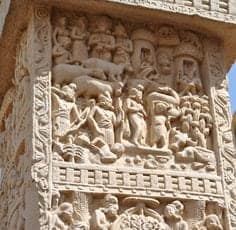
Similarly, in a number of Jātaka tales (stories of the previous births of the Buddha), such as the Sāma-Jātaka, the Buddha teaches about his past displays of generosity and gratitude to his parents. He gently encourages his audience to uphold these noble values as a way to accumulate merit. This story was popular in early India; and we can find a beautiful depiction on the gateway of the first century Great Stupa of Sanchi in Madhya Pradesh. We also find mural paintings of the Sāma caring for his blind parents in the Thousand Buddha caves in Dunhuang. The tale also spread throughout Southeast Asia, and we find examples in Myanmar and Thailand.
Respect for Parents as a Societal Decree
Royal patrons of Buddhism throughout history encouraged their followers to respect their parents. The Mauryan emperor, Aśoka, erected pillars throughout his kingdom, offering advice to his subjects. An excerpt from one of these pillars reads:
Beloved-of-the-Gods, King Piyadasi, speaks thus: Twelve years after my coronation this has been ordered—Everywhere in my domain the Yuktas, the Rajjukas and the Pradesikas shall go on inspection tours every five years for the purpose of Dhamma instruction and also to conduct other business. Respect for mother and father is good, generosity to friends, acquaintances, relatives, Brahmans and ascetics is good, not killing living beings is good, moderation in spending and moderation in saving is good.
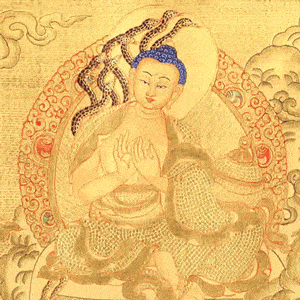
The great Indian Mahayana philosopher-adept, Nāgārjuna, in his Suhṛllekha, or “Letter to A Friend”, instructed his patron King Satavahana on the importance of respecting one’s parents.
Those who show their parents great respect
With Brahma or a Master will be linked;
By venerating them they’ll win repute,
In future they’ll attain the higher realms.1Nagarjuna’s Letter to a Friend: With Commentary By Kangyur Rinpoche (Shambhala Publications, 2006).
In his advice to the Mongolian emperor, a text known as the advice to Prince Maṅgala, the 13th century scholar Pakpa Lodro Gyaltsen wrote:
Immediately repay the kindness
Of your parents, your clan,
And anyone who has helped you in the least.2The Just King: The Tibetan Buddhist Classic on Leading an Ethical Life by Jamgon Mipham (Shambala Publications, 2017).
From such writings we see that throughout the history of Buddhism in Asia, practitioners have regularly advised followers to repay the kindness of parents. In modern times, this may see an old-fashioned custom, but if we reflect on the laws of cause and effect, and attend to the interdependent nature of all phenomena, it is quite natural and beneficial.
Practicing Dharma with Respect
Phakchok Rinpoche reminds us that if we wish to become authentic Dharma practitioners, we must first have a strong foundation of human values. This lays the groundwork for genuine practice. Please consider reading or rereading Rinpoche’s advice on the importance of basic human values here.
Share With Us
We’d be very interested in hearing from you about how your attitude toward your own parents has changed through your Dharma practice. Do you try to share your Dharma knowledge with your close family? What issues have you confronted in this process? Please share in the comments section below!




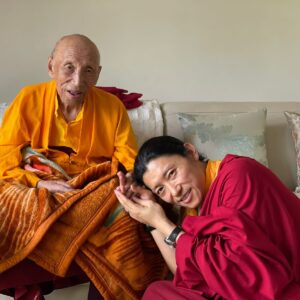
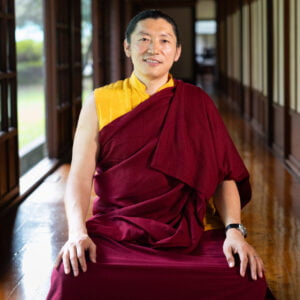
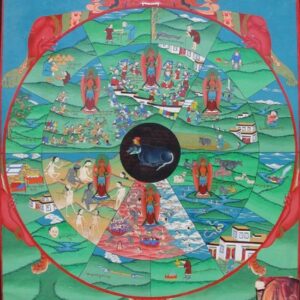


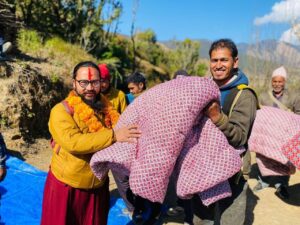
Responses
Many practitioners balk at the advice to use a mother’s love as a source for developing bodhicitta and practicing tonglen. As noted, through love our mothers put their bodies at risk as they bore us; kept us clean, protected and fed; taught us language; and the traditional texts also say taught us the ways of our culture. As a midwife for many years I have never seen a new mother who did not express love for her newborn-even those with drug additions and serious mental issues. Women who had decided to place their babies for adoption want to know if the baby is ok and if the new parents will be kind. Love for the baby is not in doubt.
But modern society is very complex- so many choices, things to learn and know, rapid changes leading to unknown futures, few community bonds, and in many countries little social support like health services, educational systems, etc. It’s very difficult for parents, mothers in particular, to navigate the challenges of parenting in our times. In addition, Western psychology has a history of vilifying mothers attributing our problems to faulty actions by our mothers and fathers. Sadly this makes if difficult for moderns to use gratitude and respect for mother as a practice.
I’d like to propose that to engage in the contemplations and accumulations of merit as suggested we make a distinction between love and parenting. With regard to mothers, I know we all love our children but with the complexities of society may not always be so skillfull as parents. Considering this situation tenderly, we can summon respect and gratitude to acknowledge generational interdependencies.